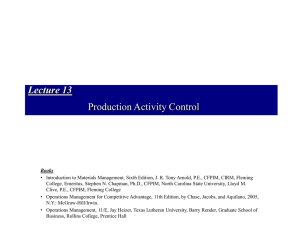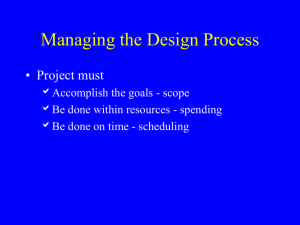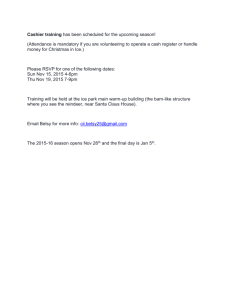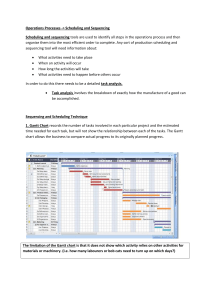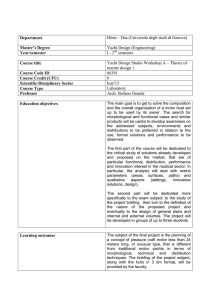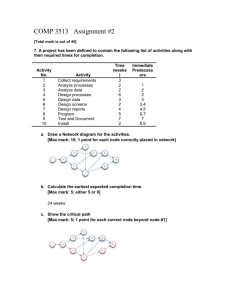Production Activity Control: Shop Floor Scheduling & Techniques
advertisement
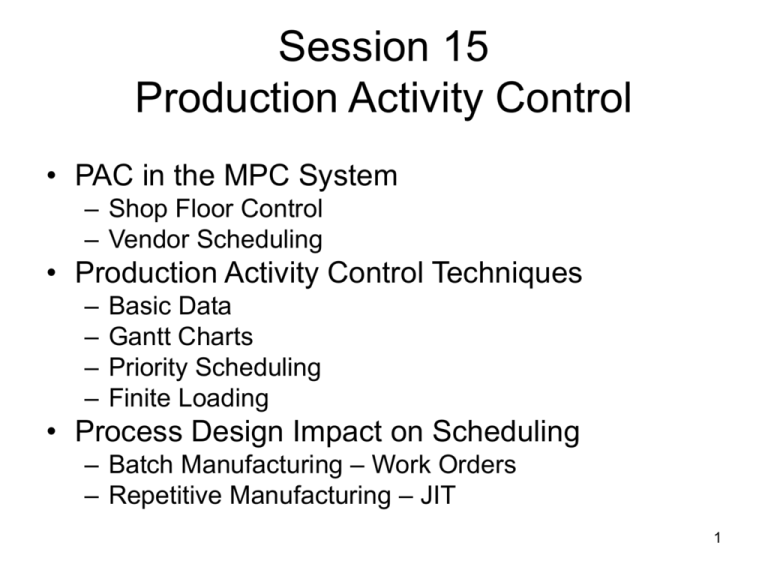
Session 15 Production Activity Control • PAC in the MPC System – Shop Floor Control – Vendor Scheduling • Production Activity Control Techniques – – – – Basic Data Gantt Charts Priority Scheduling Finite Loading • Process Design Impact on Scheduling – Batch Manufacturing – Work Orders – Repetitive Manufacturing – JIT 1 Production Activity Control in the MPC System 2 Basic Data 3 Routing Data and Operation Setback Chart 4 Gantt Charts The incoming orders at Tom's Sailboard follow different routes through the shop but all orders must stop at each of the three work centers in the plant. The table below shows all tasks for four jobs that arrive over 5 days and need to be scheduled at the company. It is currently November 10 and Tom works a sevenday week. _____________________________________________________ Order (B)iff (G)riffin (H)erbie (K)errie Arrival date Nov. 10 Nov. 10 Nov. 12 Nov. 14 Job/WC Processing time (days) routing WC 1 WC 2 WC 3 1-3-2 1 3 1 2-3-1 2 2 2 3-2-1 3 1 2 2-1-3 1 3 1 Assume that the new material for all orders is in stock and that a first-come/first-served sequencing rule is used at all work centers. All three work centers are idle as work begins on orders B and G on November 10. 5 Tom’s Sailboard a. Construct a Gantt chart depicting the processing and idle times for the three work centers for these four jobs. Order (B)iff (G)riffin (H)erbie (K)errie Arrival date Nov. 10 Nov. 10 Nov. 12 Nov. 14 Job/WC Processing time (days) routing WC 1 WC 2 WC 3 1-3-2 1 3 1 2-3-1 2 2 2 3-2-1 3 1 2 2-1-3 1 3 1 6 Tom’s Sailboard b. How many days does each job wait in queue for processing at work center 2? The determination of how long jobs wait at work center 2 is as follows: B and G are processed immediately at work center 2, order K must wait 1 day (11/14) and order H waits 4 days (11/12, 11/13 at WC3) and (11/16 and 11/17 at WC2). 7 Priority Sequencing Rules • • • • First Come, First Served Shortest Operation Next Earliest Due Date Order Slack: (Time Remaining until Due Date – Sum of Remaining Setup and Run Time) • Slack per Operation • Critical Ratio: (Due Date-Now)/(Lead Time Remaining) ________________________________________ Lead Time Remaining includes setup, run, move and queue time for all remaining operations. 8 Knox Machine 2. The jobs below are waiting to be processed at the P&W Grinder at the Knox Machine Company. (There are no other jobs and the machine is empty.) __________________________ Job A B C D Machine processing time (in days)*__ 4 1 5 2 Date job arrived at this machine 6-23 6-24 7-01 6-19 Job due date__ 8-15 9-10 8-01 8-17 *Note: This is the final operation for each of these jobs. ___________________________________________________________ 9 Knox Machine: Solution a. The production manager has heard about three dispatching rules: the Shortest Operation Next Rule, the First-Come/First-Served Rule, and the Earliest Due Date Rule. In what sequence would these jobs be processed at the P&W grinder if each rule was applied? 1. 2. 3. Job A B C D The shortest operation next rule: B-D-A-C The first-come, first-served rule: D-A-B-C The earliest due date rule: C-A-D-B Machine processing time (in days)*__ 4 1 5 2 Date job arrived at this machine 6-23 6-24 7-01 6-19 Job due date__ 8-15 9-10 8-01 8-17 *Note: This is the final operation for each of these jobs. 10 Knox Machine: Solution b. If it's now the morning of July 10 and the Shortest Operation Next Rule is used, when would each of the four jobs start and be completed on the P&W grinder? (Express your schedule in terms of the calendar dates involved, assuming that there are 7 working days each week.) P & W Grinder Job B Date 7/10 D 7/11 A 7/12 7/13 7/14 7/15 C 7/16 7/17 7/18 7/19 7/20 7/21 11 Critical Ratio Scheduling Eight weeks remain for constructing the a 50foot yacht. Assume that each week consists of 5 work days, for a total lead time of 40 days. The work required to complete the yacht comprises 10 operations, 4 days for each. 12 Yacht Project Example a. On Tuesday morning of week 3, 3 of the 10 operations had been completed and the yacht was waiting for the fourth operation. What's the critical ratio priority? Time Remaining 40 11 Critical Ratio 1.04 Work Remaining 28 13 Yacht Project Example b. What's the critical ratio priority if only 2 of the 10 operations are completed by Tuesday morning of week 3? Time Remaining 40 11 Critical Ratio .91 Work Remaining 32 14 Finite Loading 15 The Bundy Company The Bundy Company produces for three products (A, K, and P). Each order goes through the same three machine centers, but not necessarily in the same sequence. Each order must be finished at a machine center before another can be started. Orders cannot be split. The shop works a single eight-hour shift five days per week. Assume that the time to move between machines is negligible. each machine center is operated eight hours per day. All three machines are currently available for scheduling, and no further orders will arrive. 16 The Bundy Company Machine center Order routing A 3-1-2 K 2-3-1 P 3-2-1 Processing time at machine center ___(in days)____ Order 1 2 3 due date 1 3 2 14 3 1 3 12 2 3 4 10 Note: Order due dates are fixed based on the shop calendar. It is now 8:00 A.M. Monday (day 1), Monday of next week is day 6, etc. 17 The Bundy Company Using the horizontal loading procedure with earliestdue-date priority sequencing rule, prepare a Gantt chart showing the production schedule for the three orders above. Machine Center 1 P-3 Machine K–1 Center 2 Machine Center 3 P-2 P-1 1 K-3 2 A-3 K-2 3 4 5 6 A-2 A-1 7 8 9 10 11 12 13 14 15 16 17 18 18 The Bundy Company Using the vertical loading procedure and the shortestoperation-next priority sequencing rule, prepare a Gantt chart showing the production schedule for the three orders above. Machine Center 1 K-3 A-2 Machine K-1 Center 2 Machine Center 3 A-3 A–1 1 P-3 2 P-2 K-2 3 4 P-1 5 6 7 8 9 10 11 12 13 14 15 16 19 Process Design Impact Scheduling • Batch Manufacturing: Work Orders • Repetitive Manufacturing: JIT/Kanban 20
